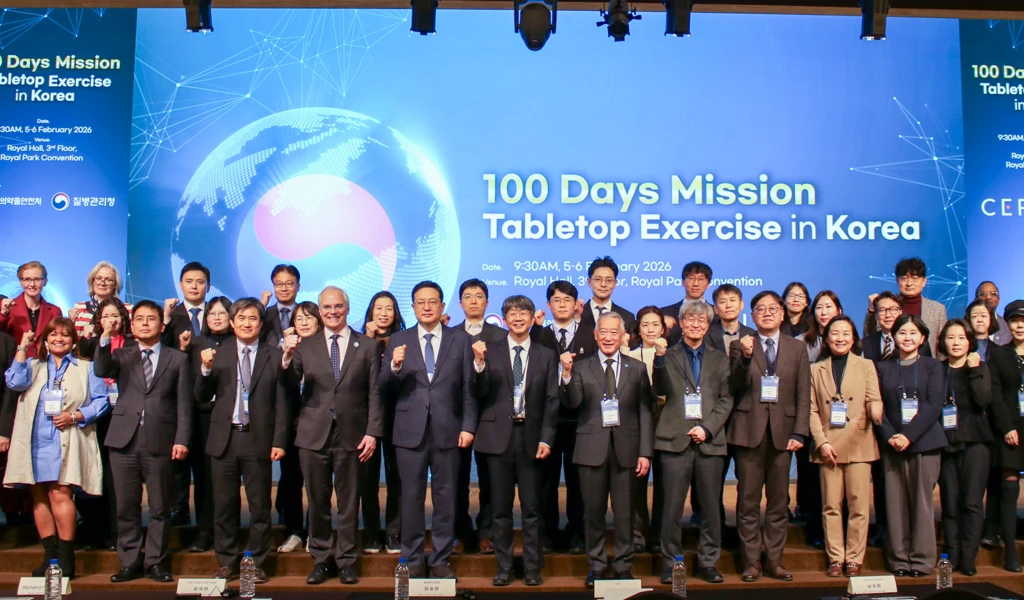27 Aug 2024; OSLO, Norway; CAPE TOWN, South Africa: Scientists in South Africa will investigate whether synthetic DNA could act as an alternative to traditional plasmid DNA required for mRNA vaccines—potentially making the initial phase of the vaccine development process up to three times faster.
In a US$2.05 million CEPI-funded project, researchers at Afrigen Biologics, a South African biotech company that is home to the mRNA Technology Transfer Programme, will explore whether optimised synthetic DNA can help to reduce mRNA vaccine development timelines for emergency use in the event of a disease outbreak. The CEPI-Afrigen partnership supports the 100 Days Mission—a goal embraced by leaders of the G7 and G20 to reduce vaccine development timelines to a little over three months in response to a pandemic threat.
In mRNA vaccines, pDNA—or Plasmid DNA—is traditionally used as the ‘start material’ required to begin vaccine development. It contains the genetic instructions for producing a specific viral protein, which helps the immune system learn to recognise and fight off a potential infection. Developing pDNA for vaccines is produced by bacterial fermentation and can take over 30 days. This process is time-consuming and expensive, and timelines can be further compounded by insufficient manufacturing capacity and supply chain issues.
By contrast, optimised synthetic DNA (oDNA), manufactured by Syngoi—a CRDMO with proprietary technology—is produced using enzymes, a cell-free process which requires a smaller manufacturing footprint, can be rapidly produced in just ten days, and are less costly. CEPI is exploring the use of this technology in a proof-of-concept project with Afrigen, using pDNA and oDNA to develop an mRNA vaccine for Rift Valley fever and examining the data generated from comparability studies to assess the suitability of oDNA for mRNA vaccine development. If successful, the oDNA technology could accelerate the production of clinical trial material required to test new mRNA vaccines in human clinical trials and ultimately make vaccines available more swiftly to those most in need.
“mRNA vaccine manufacturing processes are fast and flexible; innovative technologies like optimised synthetic DNA can make them even faster,” said Ingrid Kromann, CEPI’s Acting Executive Director, Manufacturing and Supply Chain. “CEPI’s partnership with Afrigen could reduce the vaccine development timelines by addressing the challenges associated with plasmid-DNA supply, helping get vaccines to people faster in the face of an outbreak and reduce inequity.”
Afrigen Biologics is the Hub for the World Health Organization and Medicines Patent Pool co-led mRNA Technology Transfer Programme established in 2021, acting as a centre of excellence and training for the initiative which aims to build capacity in low- and middle-income countries to produce mRNA vaccines. This new partnership could potentially play a role in enabling local manufacturing of vaccines in Africa, in line with CEPI’s strategy to geo-diversify global manufacturing capabilities.
“Afrigen and our technology collaborator Syngoi consider this partnership with CEPI as a strategic milestone, demonstrating the important contribution that biotechnology start-up companies can make to innovation in pursuit of the 100 Days Mission. We are enthusiastic about the contribution this joint project can make to the speed and cost of mRNA vaccine manufacturing,” said Prof Petro Terblanche, CEO of Afrigen Biologics.
Equitable access to vaccines
Enabling global equitable access to vaccines is central to CEPI’s work and at the heart of the 100 Days Mission. Innovations that accelerate the speed and scaling up of vaccine manufacturing will make a vital contribution to access when facing a future novel infectious disease by reducing the period during which vaccines against new pathogens are in short supply, thereby significantly increasing the prospects for more equitable distribution.
CEPI and Afrigen are committed to enabling equitable access to the outputs of this CEPI-supported programme, in line with CEPI’s Equitable Access Policy. This ultimately includes commitment to vaccines being available first to populations at risk when and where they are needed at an affordable price should a related vaccine be developed further using CEPI funding. Project results, including data generated as part of this project, will be published open access for the benefit of the global scientific community.
—ENDS—
About CEPI
CEPI is an innovative partnership between public, private, philanthropic and civil organisations. Its mission is to accelerate the development of vaccines and other biologic countermeasures against epidemic and pandemic threats so they can be accessible to all people in need. CEPI has supported the development of more than 50 vaccine candidates or platform technologies against multiple known high-risk pathogens or a future Disease X. Central to CEPI’s pandemic-beating five-year plan for 2022-2026 is the ‘100 Days Mission’ to compress the time taken to develop safe, effective, globally accessible vaccines against new threats to just 100 days.
About Afrigen Biologics
Afrigen Biologics, is a Biotech Start-up company based in Cape Town South Africa, and is a leading innovator in the field of medical biotechnology on the Continent, dedicated to advancing healthcare through cutting-edge research and development. With a commitment to excellence and a passion for innovation, Afrigen strives to deliver transformative therapies that make a meaningful difference in patients' lives.
Having successfully established the WHO/MPP mRNA Vaccine Technology Transfer hub in South Africa, Afrigen is well on its way to locally develop and manufacture mRNA vaccines focusing on disease burden in Africa and other low-middle-income countries. Furthermore, Afrigen through international partnerships and local capacity building has established the first-ever vaccine adjuvant production and formulation technology center on the African continent focusing on next-generation vaccine adjuvants, which are not only geared at preventing disease, but have therapeutic value. Afrigen was founded by the Industrial Development Corporation that holds 49% equity in Afrigen while Avacare Health holds 51%.
For more information on Afrigen, please visit https://www.afrigen.co.za/.
About Syngoi Technologies
Syngoi is a CRDMO focused on the production of synthetic linear DNA through a new proprietary enzymatic process that addresses the needs of advanced therapies where DNA is the medicinal product or the fundamental starting material. The company was founded in 2021 by Columbus Venture
Partners and it’s located at the technology park of Zamudio in Bilbao (Bizkaia, Spain).
For more information about Syngoi Technologies, visit https://syngoi.com/



.webp)
